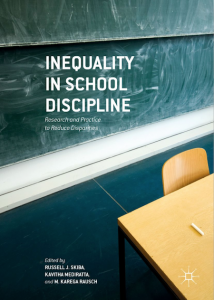New Book Examines Inequality in School Discipline
Resource type: News
Palgrave Macmillan | [ View Original Source (opens in new window) ]

Inequality in School Discipline fills a critical void by providing the most current and authoritative information on what is known about disciplinary disparities. School exclusion—out-of-school suspension and expulsion in particular—remains a substantial component of discipline in our nation’s schools, and those consequences continue to fall disproportionally on certain groups of learners.
- Explores discipline disparities in American schools using the most up-to-date research available
- Presents a comprehensive framework for defining and implementing interventions to improve equity and fairness in the application of school discipline
- Includes work from the top scholars in discipline reform
The negative consequences of frequent and inequitable use of school exclusion are substantial, including higher rates of academic failure, dropout, and contact with the juvenile justice system.
As educators, policymakers, community leaders, and other youth-serving organizations begin the difficult work of creating more equitable school disciplinary systems, the need for effective disparity-reducing alternatives could not be more important.
Drawing on the multi-year ground-breaking work of the Discipline Disparities Collaborative, the chapters in this book provide cutting edge knowledge supporting a new national imperative to eliminate race, gender, disability, and sexual orientation-based disciplinary disparities.
About the Editors
Russell J. Skiba is Professor in School Psychology and Director of the Equity Project at Indiana University, USA. He is among the most cited researchers in the nation on racial and ethnic disparities in school discipline. In addition to numerous publications in peer-reviewed journals and book chapters, he has consulted with numerous states and districts on school discipline, school violence, and reducing disparities.
Kavitha Mediratta is Chief Strategy Advisor for Equity Initiatives and Human Capital Development at The Atlantic Philanthropies. She is a national leader in reforming zero tolerance school discipline and improving educational systems. In addition to publications on those topics, she has authored numerous publications and book chapters on community organizing and grassroots activism for public education reform.
M. Karega Rausch is Adjunct Faculty member at Indiana University, USA. He has authored or co-authored more than twenty professional publications with an emphasis on racial/ethnic disproportionality in school discipline and special education. He is also a sought after speaker and expert in charter school accountability.
Read the Introduction
Buy the Book
Table of Contents
Section I. Discipline Disparities: A Research-to-Practice Collaborative
Introduction
Kavitha Mediratta and M. Karega Rausch
Chapter 1 What Do We Know about Discipline Disparities? New and Emerging Research
Russell Skiba, Mariella Arredondo, Chrystal Gray, and M. Karega Rausch
Chapter 2 How Educators Can Eradicate Disparities in School Discipline
Anne Gregory, James Bell, and Micha Pollock
Section II. Understanding and Addressing Disparities: What We Are Learning and What We Can Do
Chapter 3 Sexual Orientation-Based Disparities in School and Juvenile Justice Discipline Practices: Attending to Contributing Factors and Evidence of Bias
Paul Poteat, Jillian Scheer, and Eddie S.K. Chong
Chapter 4 Does Teacher-Student Racial/Ethnic Congruence Predict Black Students’ Discipline Risk?
Jamilia Blake, Danielle Smith, Miner Marchbanks, Allison Seibert, and Eun Sook Kim
Chapter 5 Reducing Racial Disparities in School Discipline: Structured Decision-making in the Classroom
Aishatu Yusuf, Angela Irvine, and James Bell
Chapter 6 School-wide Positive and Restorative Discipline (SWPRD): Integrating School-wide Positive Behavior Interventions and Supports and Restorative Discipline
Claudia Vincent, John Inglish, Erik Girvan, Jeffrey Sprague, and Timothy McCabe
Chapter 7 Ecologies of School Discipline for Queer Youth: What Listening to Queer Youth Teaches Us About Transforming School Discipline
Boyd Bellinger, Nicole Darcangelo, Stacey Horn, Erica Meiners, and Sarah Schriber
Chapter 8 The Potential of Restorative Approaches to Discipline for Narrowing Racial and Gender Disparities
Anne Gregory and Kathleen Clawson
Chapter 9 Intersectional Inquiries with LGBTQ and Gender Nonconforming Youth of Color: Participatory Research on Discipline Disparities at the Race/Sexuality/Gender Nexus
Jennifer Chmielewski, Kimberly Belmonte, Brett Stoudt, and Michelle Fine
Chapter 10 Research and Training to Mitigate the Effects of Implicit Stereotypes and Masculinity Threat on Authority Figures’ Interactions with Adolescents and Minorities
Kimberly Barsamian Kahn, Phillip Atiba Goff, and Jack Glaser
Chapter 11 Discipline Disparities for LGBTQ Youth: Challenges That Perpetuate Disparities and Strategies to Overcome Them
Shannon Snapp and Stephen Russell
Chapter 12 From Punitive to Restorative: One School’s Journey to Transform Its Culture and Discipline Practices to Reduce Disparities
Marieka Schotland, Harriet MacLean, Karen Junker, and Jean Phinney
Section III. Conclusions and Implications
Chapter 13 Eliminating Excessive and Disparate School Discipline: A Review of Research and Policy Reform
Dan Losen and Leticia Smith-Evans
Conclusion Moving Towards Equity in School Discipline
Russell Skiba
The Discipline Disparities Collaborative is an Atlantic grantee.